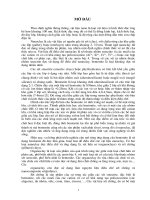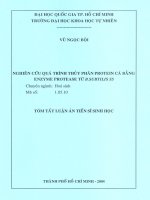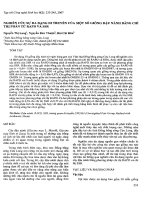NGHIÊN CỨU QUÁ TRÌNH THỦY PHÂN-LÊN MEN AXIT XITRIC TỪ BÃ ĐẬU NÀNH BẰNG ASPERILLUS ORYZAE VÀ ASPERGILLUS NIGER pot
Bạn đang xem bản rút gọn của tài liệu. Xem và tải ngay bản đầy đủ của tài liệu tại đây (37.66 KB, 1 trang )
NGHIÊN CỨU QUÁ TRÌNH THỦY PHÂN-LÊN MEN AXIT XITRIC TỪ
BÃ ĐẬU NÀNH BẰNG ASPERILLUS ORYZAE VÀ ASPERGILLUS
NIGER
A RESEARCH ON THE HYDROLYSIS AND FERMENTATION PROCESS
OF CITRIC ACID FROM SOYBEAN-RESIDUE BY USING
ASPERGILLUS ORYZAE AND ASPERGILLUS NIGER
Trương Thị Minh Hạn, Nguyễn Thị Thanh Tịnh
Trường Đại học Bách Khoa
TÓM TẮT
Bài báo này trình bày kết quả nghiên cứu quá trình thủy phân và lên men axit xitric từ bã đậu nành.
Bã đậu nành là phụ phẩm giàu chất xơ của nhiều sản phẩm trong ngành công nghiệp thực phẩm như:
sữa đậu nành, bột dinh dưỡng từ đậu nành, đậu khuôn…, được sử dụng làm môi trường lên men axit
xitric. Trước hết, bã đậu nành được thủy phân nhờ hệ enzym thủy phân phong phú như xenlulaza,
amylaza, proteaza của chủng nấm mốc Aspergillus oryzae. Sau đó, dịch thủy phân này được lên men
xitric bằng chủng nấm mốc Aspergillus niger. Kết quả nghiên cứu một số yếu tố ảnh hưởng đến quá
trình thủy phân và lên men cho thấy, phương pháp thủy phân và lên men đồng thời là hiệu quả nhất. Bã
đậu nành được bổ sung 3% metanol và 3ml (NH4)2SO4 0,1% đem thủy phân và lên men với điều kiện
pH = 3,4 – 4 và nhiệt độ 30oC. Axit xitric thu được 8,24g/100g bã đậu nành sau 11 ngày thủy phân và
lên men.
Từ khóa: Axit xitric; bã đậu nành; thủy phân; lên men; thủy phân và lên men đồng thời; nấm mốc
ABSTRACT
In this paper, we present our research results on the hydrolysis and fermentation process of citric
acid from soy-residue. Soy-residue, which is a fiber-rich by-product of many products in the food
industry such as soy milk, soy powder and tofu, is used as a medium for citric acid fermentation. First,
we hydrolyze soy-residue by using a prolific enzyme system such as cellulase, amylase and protease of
Aspergillus oryzae. Subsequently, the obtained solution is citric-fermented by using Aspergillus niger.
By investigating the factors that influence the hydrolysis and fermentation process, we find out that
carrying out the process of hydrolysis and fermentation simultaneously is the most effective method.
Soy-residue is supplemented with 3% methanol and 3ml (NH4)2SO4 0,1%, and hydrolyzed and
fermented under the pH of 3,4 – 4 at 30oC. After 11 days of hydrolysis and fermentation, the amount
of citric acid obtained is 8.24g per 100g of soy-residue.
Keywords: Acid citric; soy-residue; hydrolysis; fermentation; hydrolysis and fermentation
simultaneously









